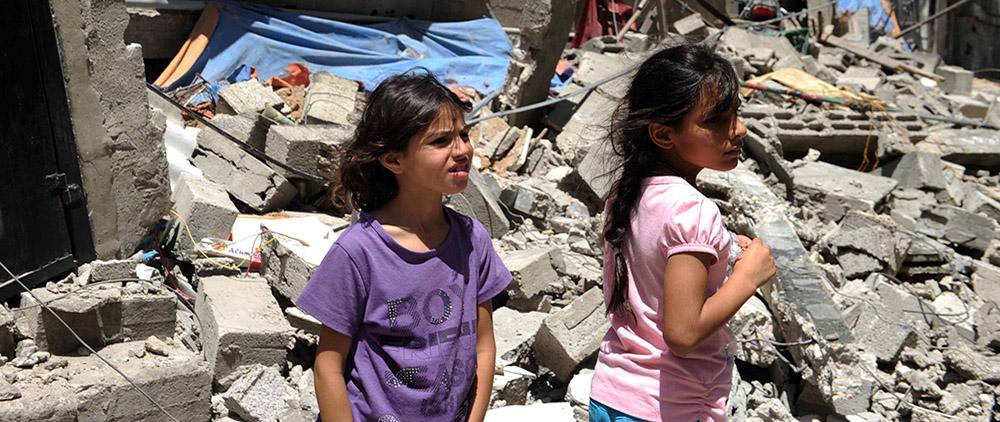Israel and Egypt’s insane alliance against Gaza
By Khaled Diab
Despite Egypt's mediating role, it is no impartial broker on Gaza. It shares Israel's view that Hamas can be crushed and suffocated into submission.

Sunday 10 August 2014
Egypt-Israel-Gaza is possibly one of the most bizarre and perhaps twisted love-hate triangles of recent times. Washington's credentials as an honest broker have rightly been questioned over the years, and Egypt was traditionally seen as a welcome counterbalance to US bias, but can Cairo today be seen as a pro-Palestinian or even impartial broker?
Not really. For the past year or so, ever since Abdel-Fatah al-Sisi became the de facto leader and then president of Egypt, his regime has been an enthusiastic accomplice in the Israeli-led blockade against Gaza, completely sealing off the Rafah crossing and destroying hundreds of tunnels into the Sinai which provided the Gazan economy with some respite from the siege.
Taking a page out of Israel's handbook, Egyptian officials leaked plans to Reuters earlier this year that Egypt intends to topple Hamas by, among other things, fomenting dissent in Gaza and backing Fatah.
On top of that, military-aligned television presenters and hosts have been ratcheting up the rhetoric and disinformation against Hamas in Gaza. Despite the continued presence of critical voices, including normally pro-regime anchors, this anti-Hamas propaganda reached fever pitch when hostilities began in early July.
Tawfik Okasha, the military junta's leading TV cheerleader, praised Israel's military campaign in Gaza and mocked Gazans on his show. “Gazans are not men,” he taunted live on air. “If they were men, they would revolt against Hamas.”
“Bless you, Netanyahu, and may God give us more like you who will rid us of Hamas, the root of corruption, treason and collaboration with the Brotherhood,” tweeted Azza Sami, a journalist with the semi-official Al Ahram newspaper.
Egypt's stance has, unsurprisingly, met with much praise in Israel. However, this Egyptian-Israeli love affair has set alarm bells ringing even among normally staunch supporters of Israel. For instance, the conservative, generally pro-Israel Wall Street Journal ran a long feature on this “unlikely alliance” which laid much of the blame for the escalation to open warfare on the excessive “squeezing” of Hamas.
For their part, Palestinians have generally reacted with bewilderment and anger that a country they regarded as an ally has left Gaza to burn, regardless of what they think about Hamas. Many Palestinian I encounter ask me, with a tone of severe disappointment and betrayal in their voices, what Egypt's game is and why it is allowing fellow Arabs to die in this way.
Some Palestinians and Arab sympathisers have gone so far as to see the hidden hand of conspiracy theories at work, and are convinced that al-Sisi and his regime are US and Zionist agents.
Despite the fact that the al-Sisi regime, under worldwide attack for its lack of democratic legitimacy and widespread human rights abuses, wants Washington on side, this is certainly not the case.
Egypt's punitive approach towards Hamas is actually not all that new, though it has become far more severe. The Mubarak regime also distrusted and disliked Hamas and played its part in maintaining the Israeli blockade. Even Morsi, the Muslim Brother, did little to alleviate Gaza's suffering, though he eased the blockade slightly.
The Egyptian president's strident hostility towards Hamas actually stems from al-Sisi's hatred of the Muslim Brotherhood, a movement he has persecuted since toppling his Brotherhood predecessor, Mohamed Morsi, following massive protests. The Egyptian regime has falsely alleged that Hamas was guilty of stealing Egyptian resources during Morsi's 12-month term in office and is behind an insurgency in the Sinai.
This may partly be out of genuine conviction but is also certainly a political ruse to keep popular anti-Brotherhood sentiment and hostility high to justify al-Sisi's self-declared “war on terrorism”, to manufacture consent, like in Israel, by creating a frightening common enemy, and to crush opposition.
Where once Arab leaders sometimes used Israel as an excuse to silence dissent and delay reform, al-Sisi has come up with a troublingly innovative new formula: blame the Palestinians. And a surprisingly large, if dwindling, number of Egyptians are swallowing the rhetoric.
With all this hostility in the air, Egypt has decided effectively to fight a proxy war against Hamas, by sitting on the sidelines and letting Israel bloody its hands in Gaza, with the trapped civilian population paying a deadly and heavy price, in the hope that its Islamist adversary will collapse.
However, Israeli-Egyptian calculations that Hamas can be brought down or tamed through violence are enormous miscalculations. Although Hamas's resorting to rocket attacks after some two years of respecting a ceasefire were disastrous and stupid, and walked straight into the trap set by extremist forces in Israel, the Israeli-Egyptian pincer movement over the past year had so cornered the movement that it is now fighting an existential battle in which it has nothing left to lose and, as it sees it, everything to gain.
In addition, even if Hamas falls, there is no guarantee that Fatah will take over, and even if it did, many Gazans will view it as a traitor and collaborator. There is also a strong chance that more radical groups will take over control of the Strip.
With Egypt as mediator and Israel as protagonist on the same misguided line regarding the need to contain, and preferably, topple Hamas, I am sceptical that the current talks in Cairo will lead to a lasting and durable solution, since for that to happen, requires the lifting of the blockade and the reconnecting of Gaza to the West Bank.
The sad, ironic tragedy is that Hamas could have been “contained” without a single shot being fired now, or in 2012, 2008/9 and 2006. Yes, I find Hamas's extremist ideology and its past of suicide bombings abhorrent, and, like Israel's militarism, its swift recourse to violence despite its proven futility has been extremely costly. However, ever since coming to power, Hamas, burdened with the responsibility of governing under siege, has displayed far more pragmatism than Israel.
Hamas not only dropped its calls for the destruction of Israel from its election manifesto, the party has consistently indicated its willingness to accept a two-state solution along the pre-1967 borders. Before the latest conflict, Hamas even went so far as to cede political control to the PA and a government of technocrats in the desperate hope that this would lead to the lifting of the siege.
Despite all these clear overtures, Israel's extremist, jingoistic government, desperate not to give up the territory in the West Bank conquered in 1967 and blinded by ideological hatred towards Hamas (which Israel once misguidedly supported as a counterbalance against the PLO), has refused to play ball and find a way to coexist.
If Israel and Egypt fail to find a way to live non-violently with Hamas, history will continue to repeat itself, each time more tragically than the preceding time. And Gaza will become not only the graveyard of innocent civilians but also the burial ground for the prospects for peace for generations to come.
____
Follow Khaled Diab on Twitter.
This article first appeared in Haaretz on 8 August 2014.



It’s pretty obvious why nobody cares for Gaza; just read their Covenant and you see.
Article 7 of Hamas’ covenant states “Israel will exist and will continue to exist until Islam will
obliterate it, just as it obliterated others before it”
In other words they are genocidal. They bring this on themselves.